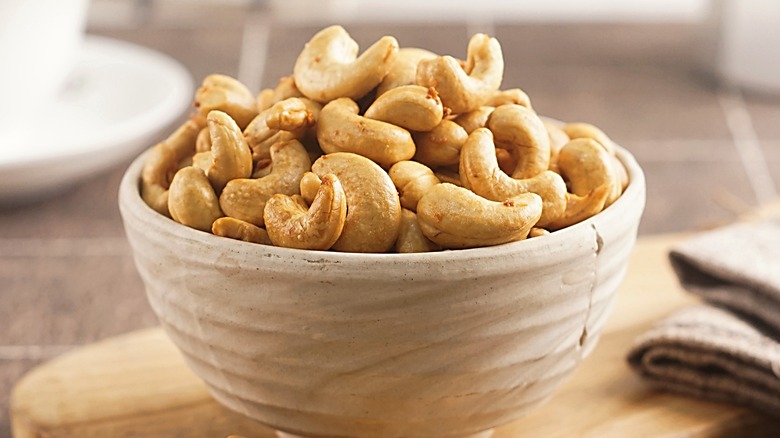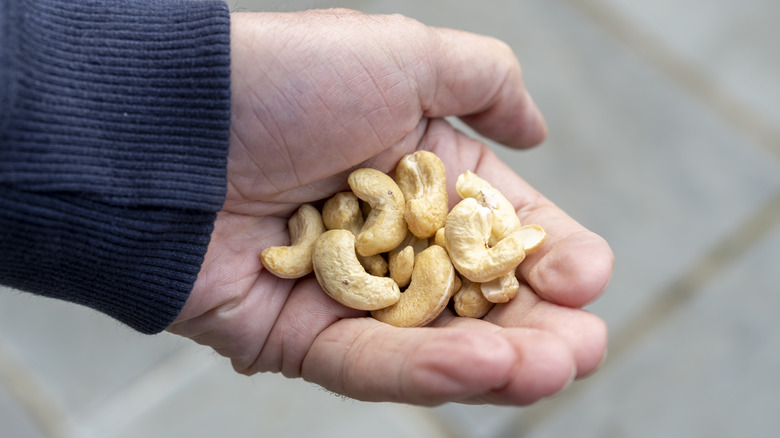When You Eat Cashews Every Day, This Is What Happens To Your Poop
Cashews have that subtle yet perfect blend of sweet and salty that makes them great for snacks, spreads, desserts, or main dishes. You can even find cashew milk in most grocery stores. If you've traveled to places like India, Vietnam, or Brazil, you might see the 45-foot cashew trees with their accessory fruit that looks like an apple or orange pear. The delicious cashew nut grows just below the cashew apple.
Just like other nuts, cashews are packed with nutrition. A one-ounce serving of dry roasted cashews has 163 calories, with 68% of those calories from fat. That sounds like a lot of fat, but cashews have just 2.6 grams of saturated fat, which means the rest of that fat is the heart-healthy unsaturated kind.
If you need some help with your poop, you'll be able to get some fiber in cashews, but not too much — almost a gram per serving, to be more specific. Still, eating cashews is a good idea, because some of the minerals will help you poop.
Nutrients that affect your ability to poop
A deficiency of certain vitamins and minerals can affect how water is absorbed in your gut and make your digestive system sluggish, according to Rupa Health. Magnesium helps alleviate constipation by drawing more water into your stool to make it easier to pass. It also activates the muscles in your digestive system to get the poop in motion. As it turns out, cashews provide 18% of your daily needs for magnesium.
Potassium works with sodium to keep your fluid levels balanced in your body. It also plays a similar role to magnesium in your digestive system. A lack of potassium in your diet can slow down or even stop activity in your GI tract. Although cashews aren't exactly the top dietary source of potassium, you'll still get 161 milligrams in a handful.
Cashews do give you 70% of your daily copper, which supports your nerve cells and immune system. Copper also assists your body with iron absorption, and cashews provide almost 2 milligrams of iron per serving.
Other benefits of cashews
Eating cashews provides other health benefits, such as improving your cholesterol levels and lowering your resistance to insulin. A 2019 study in the International Journal of Endocrinology and Metabolism divided 50 people with type 2 diabetes into two groups. While both groups consumed about the same amount of calories, one group consumed 10% of their total calories from cashews. Although there weren't any changes between groups in terms of weight loss, body mass index, or waist circumference, the cashew group had lower insulin levels and insulin resistance. Those who ate cashews also saw a lower ratio of LDL-to-HDL cholesterol levels compared to the control group, indicating a healthier cholesterol profile.
In addition to healthy fats and essential minerals, cashews also have certain compounds that can improve your health, according to a 2021 article in Bioactive Compounds in Health and Disease. Cashews have tocopherol, tocotrienol, and beta-sitosterol. Tocopherol and tocotrienol are essentially vitamin E, which serves as an antioxidant to fight cancer, aging, and inflammation. Meanwhile, beta-sitosterol can help reduce cholesterol and ease the symptoms of an enlarged prostate.



